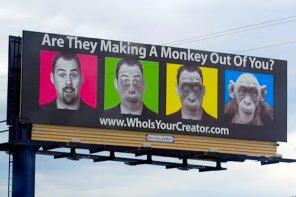Happy 200th birthday, Charles Darwin!
You know I love you. So I hope you won’t mind if I take the occasion to toast the other side of the Pandora’s Box you opened, the side that may be feeling a little battered today: the creationists. They’ve worked hard over the last 150 years since your Origin of Species came out, and because they’re still alive and you’re not, why not celebrate you by celebrating them?
Don’t worry, I’m a neo-Darwinian fundamentalist (Catholic, too), bred on old-school Richard Dawkins. My heart melts at the very sight of Carl Sagan and his angelic Ann Druyan. But I’ve also had fleeting moments, deep in the basement of my old college library, where Phillip E. Johnson convinced me evolution is all a materialist sham. I’ve eaten fish on the Bosporus with the sidekicks of the Turkish creationist guru Harun Yahya and, you know what? I had a great time (meeting Yahya himself was a bit more awkward). So here’s to good, old-fashioned, intransigent creationism!
Post-Darwinian creationism began, fittingly enough, with you, Darwin. Not to be beaten by the simultaneous discovery of Alfred Russel Wallace, you published The Origin of Species in 1859. (He never could have written it like you did.) Partly because of some embarrassing health problems, you weren’t much for defending your theory from the uproar it caused in Victorian England, so T.H. Huxley rose to the task of being your bulldog. In 1860, he had his famous debate with Bishop Samuel Wilberforce about whether it was worse to be related to an ape or a bishop. Nobody won, and both sides got punchlines that they continue to hurl to the present day.
On my side of the pond, we did what we do best: we took you to court, again and again and again. A pack of businessmen in Dayton, Tennessee saw green and orchestrated a great bout about your monkey-to-man theory. In 1925, two giants descended there for litigious combat, Clarence Darrow and William Jennings Bryan. The scientists’ testimony was thought irrelevant, so you lost the case. But creationists became the laughingstock of the big-city newspapers, sending them into hiding. Years passed, science education improved, if only to beat the Russians at it, and before long your dangerous idea was infecting the heads of schoolchildren everywhere.
Then, in the 1950s, a lonely hydraulic engineer from Texas named Henry Morris took it upon himself to change all that. Joining forces with a young theologian, he published a book in 1961 called The Genesis Flood, igniting the fire of scientific creationism—that’s right, scientific. He called American Bible beaters to task, and creationism exploded like never before. Theatrical trials started up again, though the Supreme Court beat them back in ’68 and again in ’87. In the end, pseudo-scientific creationism was expelled from the classroom, though Morris’ Institute for Creation Research carries on in Southern California. Following Morris’ lead, the Australian Ken Ham set up his Creation Museum in Kentucky back in 2007—complete with cavemen hanging out next to dinosaurs. The latest numbers from Pew say that 52% of Americans still don’t buy the monkey-to-man explanation.
In the ’90s, along came intelligent design. They sort of believe you, Darwin, but sort of don’t. Okay, says biochemist Michael Behe, maybe evolution caused the origin of most species. But he stops at the bacterial flagellum. Not that. And if not that, maybe not other things. William Dembski has all these great formulas describing a “design inference,” making his quasi-creationism a work of sexy-sounding information theory. Then came 2005-06. In Dover, Pennsylvania, ID got a court case of its own before going the way of scientific creationism.
The future of creationism, it seems, will come neither from old England nor from the brave New World. By sending his enormous Atlas of Creation to scientists and museums the world over a year or so ago, the Turk, pen-named Harun Yahya, has launched the era of globalized creationism. Now, for your birthday, he has given birth to 200thanniversaryofdarwinismscollapse.com, where users can celebrate the utter and final demise of evolution while watching you, dressed up as a clown, singing “Jingle Bells” on repeat.
All of this madness, I submit, is a testament to the power of your idea. But, as in every madness, there is method too. By now you are doubtless familiar with the wrongs done in the name of evolution. Your cousin, Francis Dalton, created the eugenics movement with your Origin in his hands. The Gilded Age capitalists loved you too. Hitler and Stalin thought they had your blessing when they exterminated millions. We know now that their interpretations were wrong. They saw in you what they wanted to see, not what you wrote or what the science means.
Because of them, however, when William Jennings Bryan fought for creationism at “Scopes,” science wasn’t foremost on his mind. Human freedom was. An equitable society was. What a shame that it came to that.
With court case after court case, in this country at least, the creationists put on a good show. The occasional monkey trial has become a national pastime, and we average about one big one per decade. It’s too bad they’re so completely wrong. Year after year, more evidence piles up pointing to the truth of your theory. It has served as the fundamental basis of modern biology, paleontology, and anthropology, through which we understand life on earth more completely than ever before. To science, creationism since your time has offered mainly obfuscation. There’s more to them than science.
As your birthday present, I’d like to offer a list. It’s not about you, exactly, but about what 150 years of creationism can teach us about your accomplishment. I hope you like it.
5 Things We Can Learn from the Creationists:
1) They show us that there is more at stake in science than science itself. People have other concerns at heart—religious, political, or otherwise.
2) They never tire of pointing out how scientific ideas can be misused by dangerous ideologies, from reckless capitalism, to vanguard communism, to Nazism. We will always need the reminder.
3) They demonstrate that, when you really stretch it, the same data can be interpreted in very different ways.
4) They encourage fuller scientific demonstrations of evolution by playing the devil’s advocate. After Michael Behe made his case about the bacterial flagellum’s intelligent design, for instance, researchers figured out how it evolved.
5) In their desire for a faith-based science, they remind us that faith and science are part of a common human urge.
I’ve made a habit lately of attending meetings of the New York City Skeptics in order learn from their science lectures and relish in their effulgent self-certainty. They are exactly, precisely, as skeptical as the crowd at Ted Haggard’s New Life Church in Colorado Springs—which is to say, about as brainwashed as the rest of us are, in one thing or another. If I tried to present this list at one of their meetings I’d be heckled at the stake as a sympathizer for the enemy. Which, by the way, I am.
For all the wonderful and necessary pretense of scientific objectivity, it is a sham. The stoniest of stone-cold scientists today are still human, and the future will be laughing out loud about the absurdity of their silly certainties. In fact, that’s the beauty of science—it changes its mind.
So today is a funny kind of day, when we’re all supposed to celebrate you, a scientist, for being right (at least so far). I want to sing your praises, but not violate the spirit of your legacy with worship. So I’ve compromised with a tribute to your creationists.
What would you do, Darwin? What Would Darwin Do? (He wouldn’t ask that question.)




